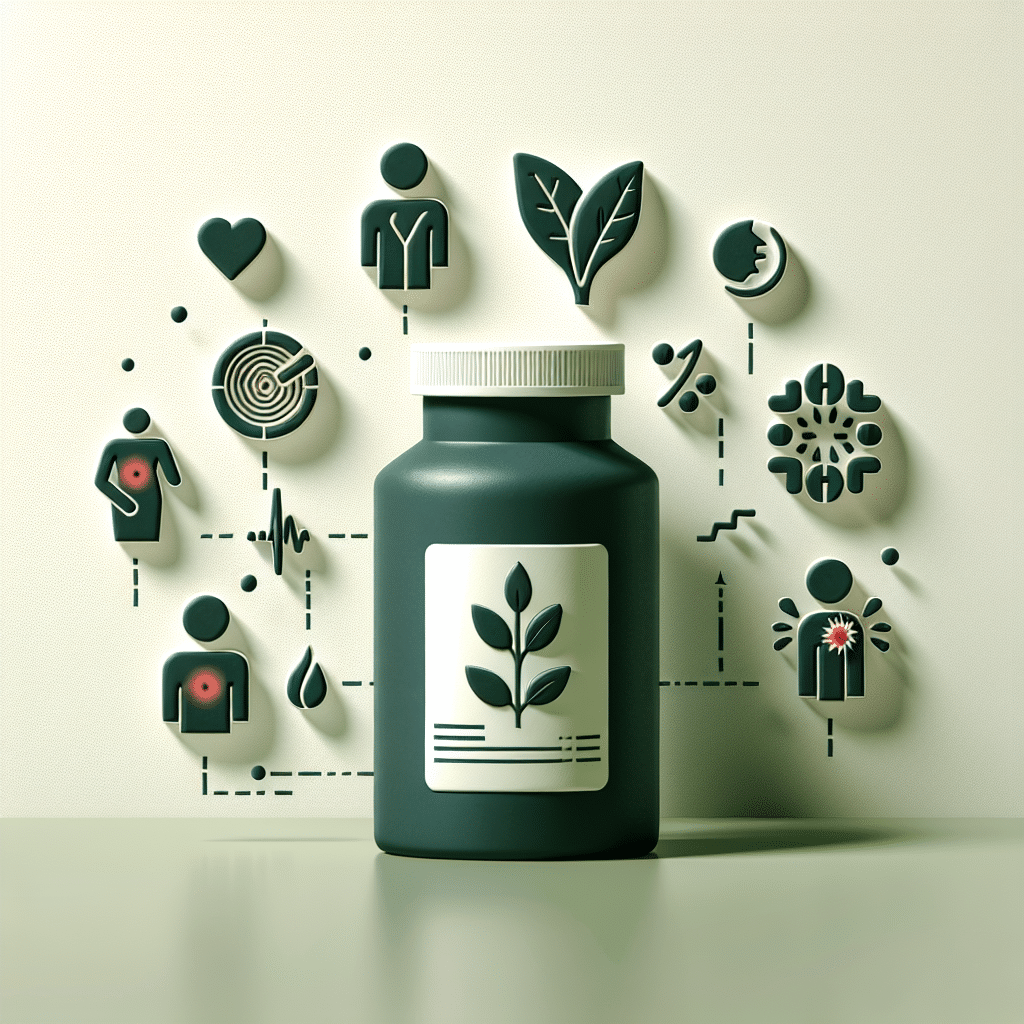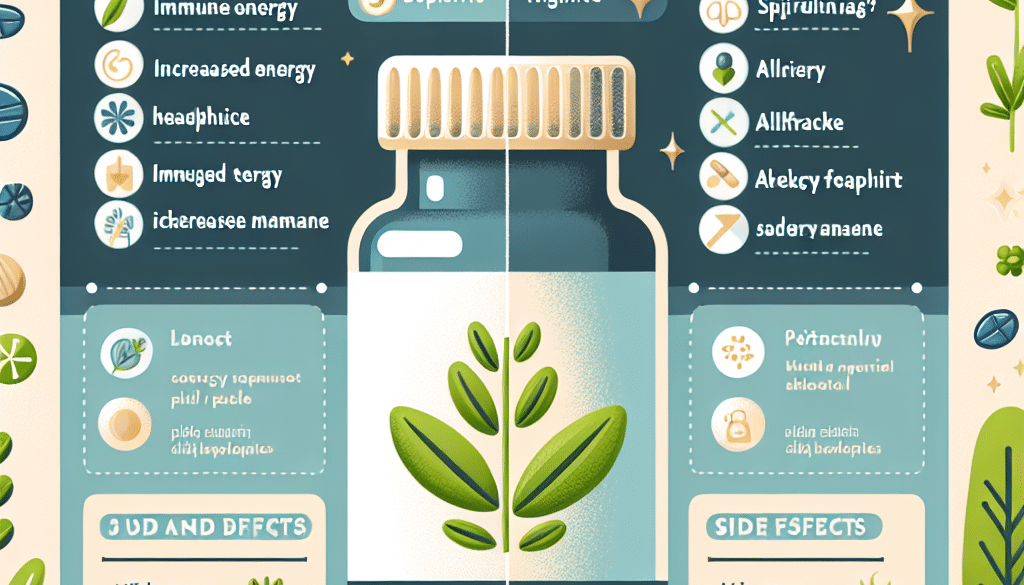What Are The Side Effects Of Taking Spirulina? Deep dive
Table of Contents
- Spirulina Side Effects: What You Need to Know Before Taking This Supplement
- Potential Side Effects of Spirulina
- Understanding the Risks of Spirulina
- Allergic Reactions to Spirulina
- Digestive Discomfort from Spirulina Intake
- Heavy Metal Contamination Concerns
- Autoimmune Reactions Triggered by Spirulina
- Medication Interactions with Spirulina
- Case Studies and Statistics on Spirulina Side Effects
- Minimizing the Risks of Spirulina Supplementation
- Conclusion: Balancing Benefits and Side Effects
- Discover ETprotein’s High-Quality Protein Products
Spirulina Side Effects: What You Need to Know Before Taking This Supplement

Spirulina, a type of blue-green algae, has gained popularity as a superfood due to its high nutrient content, including proteins, vitamins, and minerals. It is often consumed in powder or tablet form and is touted for its health benefits, which range from boosting the immune system to improving gut health. However, as with any supplement, it is essential to be aware of potential side effects. This article explores the side effects of taking spirulina, supported by research, case studies, and statistics.
Potential Side Effects of Spirulina
While spirulina is generally considered safe for most people, some individuals may experience adverse effects. Here are the most commonly reported side effects:
- Allergic Reactions: Some individuals may be allergic to spirulina, leading to symptoms such as hives, difficulty breathing, and swelling.
- Digestive Issues: Spirulina can cause digestive discomfort, including bloating, constipation, or diarrhea.
- Heavy Metal Contamination: If harvested from polluted waters, spirulina can be contaminated with heavy metals like lead, mercury, and arsenic, which can be harmful to health.
- Autoimmune Reactions: Spirulina may stimulate the immune system, potentially exacerbating conditions like lupus, rheumatoid arthritis, and multiple sclerosis.
- Interactions with Medications: Spirulina can interact with certain medications, including blood thinners and immune suppressants.
Understanding the Risks of Spirulina
While spirulina is a rich source of nutrients, it is crucial to understand the risks associated with its consumption. Here are some detailed insights into the potential side effects:
Allergic Reactions to Spirulina
Although rare, allergic reactions to spirulina can occur. A case study published in the Journal of Allergy and Clinical Immunology reported an instance where an individual experienced anaphylaxis after consuming spirulina. Those with allergies to seafood or seaweed may be at higher risk and should exercise caution.
Digestive Discomfort from Spirulina Intake
Some users report gastrointestinal issues after taking spirulina. A study in the International Journal of Biological Macromolecules found that high doses of spirulina could cause digestive problems in some individuals. It is recommended to start with a lower dose and gradually increase it to minimize these effects.
Heavy Metal Contamination Concerns
Contamination with heavy metals is a significant concern with spirulina supplements. Research has shown that spirulina sourced from certain regions can contain dangerous levels of toxins. Consumers should ensure they purchase spirulina from reputable sources that test for heavy metal contamination.
Autoimmune Reactions Triggered by Spirulina
Due to its immune-boosting properties, spirulina might not be suitable for individuals with autoimmune diseases. A review in the Autoimmunity Reviews journal suggests that spirulina could potentially trigger flare-ups in autoimmune conditions.
Medication Interactions with Spirulina
Spirulina can affect the way certain medications work in the body. For example, it can enhance the effects of blood thinners, increasing the risk of bleeding. It is essential to consult with a healthcare provider before combining spirulina with any medication.
Case Studies and Statistics on Spirulina Side Effects
Case studies and statistics provide valuable insights into the real-world implications of spirulina side effects. For instance, a study in the Journal of Medicinal Food found that out of 25 spirulina supplements tested, 20% contained concerning levels of lead. These findings underscore the importance of choosing high-quality spirulina products.
Minimizing the Risks of Spirulina Supplementation
To minimize the risks associated with spirulina supplementation, consider the following tips:
- Start with a low dose and gradually increase it to assess tolerance.
- Purchase spirulina from reputable suppliers that conduct third-party testing for contaminants.
- Consult with a healthcare provider before taking spirulina, especially if you have pre-existing health conditions or are taking medications.
- Be aware of the signs of an allergic reaction and seek medical attention if necessary.
Conclusion: Balancing Benefits and Side Effects
In conclusion, while spirulina offers numerous health benefits, it is not without potential side effects. By being informed about these risks and taking precautions, individuals can safely incorporate spirulina into their diet. Always prioritize quality and safety when selecting a spirulina supplement to ensure the best possible outcomes for your health.
Discover ETprotein’s High-Quality Protein Products
If you’re looking for alternative protein sources that are safe and high-quality, consider ETprotein’s range of organic bulk vegan proteins. Their products are non-GMO, allergen-free, and tested for purity, making them an excellent choice for those seeking reliable protein supplements.
About ETprotein:
ETprotein, a reputable protein and L-(+)-Ergothioneine (EGT) Chinese factory manufacturer and supplier, is renowned for producing, stocking, exporting, and delivering the highest quality organic bulk vegan proteins and L-(+)-Ergothioneine. They include Organic rice protein, clear rice protein, pea protein, clear pea protein, watermelon seed protein, pumpkin seed protein, sunflower seed protein, mung bean protein, peanut protein, and L-(+)-Ergothioneine EGT Pharmaceutical grade, L-(+)-Ergothioneine EGT food grade, L-(+)-Ergothioneine EGT cosmetic grade, L-(+)-Ergothioneine EGT reference grade and L-(+)-Ergothioneine EGT standard. Their offerings, characterized by a neutral taste, non-GMO, allergen-free attributes, with L-(+)-Ergothioneine purity over 98%, 99%, cater to a diverse range of industries. They serve nutraceutical, pharmaceutical, cosmeceutical, veterinary, as well as food and beverage finished product distributors, traders, and manufacturers across Europe, USA, Canada, Australia, Thailand, Japan, Korea, Brazil, and Chile, among others.
ETprotein specialization includes exporting and delivering tailor-made protein powder and finished nutritional supplements. Their extensive product range covers sectors like Food and Beverage, Sports Nutrition, Weight Management, Dietary Supplements, Health and Wellness Products, and Infant Formula, ensuring comprehensive solutions to meet all your protein needs.
As a trusted company by leading global food and beverage brands and Fortune 500 companies, ETprotein reinforces China’s reputation in the global arena. For more information or to sample their products, please contact them and email sales(at)ETprotein.com today.












